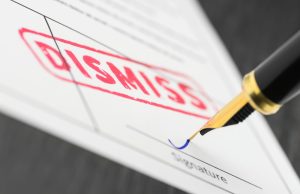 Facing criminal charges is a stressful, unsettling experience. You worry about the short-term and long-term consequences. You dread the potential effects of these charges on your freedom, finances, livelihood, and reputation. However, criminal charges do not always result in a conviction. Based on the circumstances of your case, the prosecutor may drop the pending criminal charges before your case even goes to trial. Even if your case goes to trial, the prosecutor or the judge may ultimately dismiss the charges.
Facing criminal charges is a stressful, unsettling experience. You worry about the short-term and long-term consequences. You dread the potential effects of these charges on your freedom, finances, livelihood, and reputation. However, criminal charges do not always result in a conviction. Based on the circumstances of your case, the prosecutor may drop the pending criminal charges before your case even goes to trial. Even if your case goes to trial, the prosecutor or the judge may ultimately dismiss the charges.
What Happens After an Arrest?
After an arrest, a prosecutor must build a case by gathering the evidence necessary to obtain a conviction. Every criminal offense under Texas law contains different elements or components. A prosecutor must prove every element of a criminal offense beyond a reasonable doubt. In submitting proof of your guilt, the law limits a prosecutor to using only lawfully collected evidence.
The defense attorneys at Rosenthal Kalabus & Therrian will aggressively attack each element of proof in the prosecution’s case. We will expose any weaknesses and fight tirelessly to get the court to drop the charges or dismiss the case.
Dropping Criminal Charges
At any stage of the prosecution preparing its case, before filing formal charges, the possibility exists that the prosecution concludes it does not have a solid case against you. If the prosecution does not believe it can obtain a guilty verdict for any reason, it will avoid expending valuable resources to try the case. At this point, the prosecution might decide to drop the charges. A prosecutor or judge can also drop charges before or after filing.
The Dismissal of Criminal Charges
When a prosecutor voluntarily dismisses a criminal case, it typically means that it formally filed charges but later decided not to proceed further. A judge may also dismiss criminal charges after the prosecutor formally files them. Only a prosecutor or judge may dismiss charges.
If the prosecution’s case is weak, an experienced, skilled criminal defense attorney can present evidence and argue that you are innocent. Your attorney could work to convince the prosecution that it will not obtain a conviction in hopes that it will drop the charges against you. If the court dismisses the case with prejudice, the prosecutor typically cannot refile the charges later.
Why Are Criminal Charges Dropped or Dismissed?
There are a variety of reasons why a prosecutor or judge may drop or dismiss criminal charges. These include:
Faulty/Insufficient Evidence
A prosecutor without sufficient evidence may drop a criminal charge. A skilled defense attorney can pinpoint and expose weaknesses in a prosecutor’s evidence.
The Fifth Amendment protects you from self-incrimination. This right does not allow you to lie, but it does allow you to refrain from answering questions if the answers may incriminate you. Without your testimony, a prosecutor may decide to drop or dismiss your charges.
Search and Seizure Violations
The Fourth Amendment protects you from unlawful searches and seizures. Any arrest based upon evidence obtained without a warrant or probable cause may be dropped because of inadmissible evidence. If no other evidence of guilt exists, the court may dismiss the charges.
Other Unlawful Police Procedures
Other procedural technicalities can cause the court to drop or dismiss charges. Failures by law enforcement to follow strict procedures during the arrest, booking, and custody of a criminal defendant may amount to Fifth and Sixth Amendment violations. The Sixth Amendment rights include speedy and public trial, trial by jury, and being informed of charges, among others.
Lack of State Resources
The prosecution in a criminal case has only a limited amount of resources. It must prioritize obtaining convictions in cases of the most heinous criminal conduct. This focus and lack of resources can cause a prosecutor to drop or dismiss charges.
Does a Dropped or Dismissed Case Remain on Your Record?
 Unfortunately, any background check will show the complaint and dismissal of the criminal matter even if the court dropped or dismissed the charges. Any job application that asks about your history of criminal charges will require you to disclose the arrest and any charges. In this situation, your only recourse is to seek an expunction or nondisclosure order.
Unfortunately, any background check will show the complaint and dismissal of the criminal matter even if the court dropped or dismissed the charges. Any job application that asks about your history of criminal charges will require you to disclose the arrest and any charges. In this situation, your only recourse is to seek an expunction or nondisclosure order.
Contact an Experienced Criminal Defense Attorney in Texas
If you believe you have been wrongfully arrested or charged, you could get the charges dropped or dismissed. There is no need to fight these charges alone. Enlist the skilled services of an experienced Collin County criminal defense team. The skilled attorneys at Rosenthal Kalabus & Therrian will mount an aggressive defense and fight to protect your valuable constitutional rights. Contact us today for a consultation. Call (972) 369-0577 or contact us online.
Related Posts:
Impact of Criminal Charges on Professional Licenses